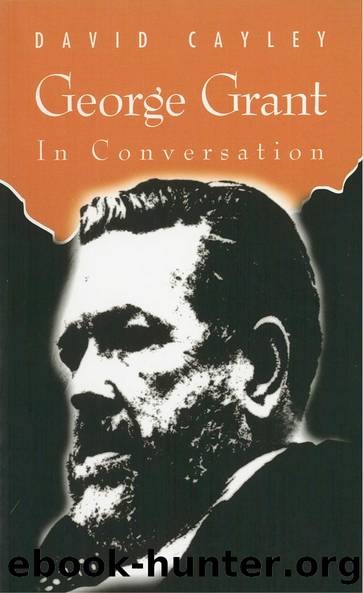George Grant in Conversation by David Cayley

Author:David Cayley [Cayley, David]
Language: eng
Format: epub
ISBN: 9781770890831
Barnesnoble:
Publisher: House of Anansi Press Inc
Published: 1995-10-01T00:00:00+00:00
IV
THE THIRD WAVE
CAYLEY: Earlier we spoke briefly about what Leo Strauss calls the third wave of modernity â the philosophy of Nietzsche and Heidegger. You have paid close attention to both these thinkers, and I would now like to talk about them in more detail.
GRANT: Well, I donât know if you think this is totally redundant, but let me say first that the great public fact of this century has been the end of Europe, caused above all by the English and the Germans fighting. And since we all live in an English-speaking society, itâs become more difficult for us to look fairly at the Germans â this great and wonderful people â because so much of our effort in this century has been to smash the Germans.
Certainly German society has been a great ambiguity in the Western world, and more so in the contemporary era, as distinct from the whole modern period. The greatest thinkers of that era have been Germans, and I would say the two supreme thinkers have been Nietzsche, about a hundred years ago, and in our present time Heidegger, Nietzscheâs great epigone. It seems to me that Nietzsche is the person, the first person, who expresses modernity at its fullest: he says it is the end of the age of reason, and he proclaims this as a great event. He says that the age of reason in the West was expressed essentially through Christianity and through the Greek philosophy that penetrated Christianity, and out of that came modern science. He calls the modern scientists âthe gravediggers of the age of reasonâ because modern science has taught us that we cannot look at the world as if all that is is rational. Modern science has made it impossible for us to believe that what is is ultimately reasonable and proceeds from the divine reason. One only has to think for a minute of Darwin to understand what he means; Nietzsche thought Darwin was a very great genius â which indeed he was.
Nietzsche claims that the age of reason was an aberration in the history of the world; the height of the world, for him, was Greek tragedy. Greek tragedy was the understanding that life is an abyss of chaos and greatness is to be destroyed â the greatness of tragedy is seeing the beautiful destroyed by the chaos of existence. He agrees with the Greek tragedians that life is a chaos. Then Socrates came along and, according to Nietzsche, he could not face the fact that existence is an abyss of chaos, and so Socrates became the great seducer of mankind into the age of reason. Christianity was just a popularization of the age of reason, Platonism for the masses.
Nietzsche sees himself as the proclaimer of the end of that age and he recognizes that the results of that end might be simply negative. Therefore, he says, Europe is transfixed with what he calls ânihilism,â nothingness. He uses the image of the three animals. The age of reason and Christianity is the age of the camel that carries around its hump on its back.
Download
This site does not store any files on its server. We only index and link to content provided by other sites. Please contact the content providers to delete copyright contents if any and email us, we'll remove relevant links or contents immediately.
The remains of the day by Kazuo Ishiguro(8962)
Tools of Titans by Timothy Ferriss(8359)
Giovanni's Room by James Baldwin(7313)
The Black Swan by Nassim Nicholas Taleb(7097)
Inner Engineering: A Yogi's Guide to Joy by Sadhguru(6782)
The Way of Zen by Alan W. Watts(6589)
Asking the Right Questions: A Guide to Critical Thinking by M. Neil Browne & Stuart M. Keeley(5751)
The Power of Now: A Guide to Spiritual Enlightenment by Eckhart Tolle(5741)
The Six Wives Of Henry VIII (WOMEN IN HISTORY) by Fraser Antonia(5493)
Astrophysics for People in a Hurry by Neil DeGrasse Tyson(5172)
Housekeeping by Marilynne Robinson(4433)
12 Rules for Life by Jordan B. Peterson(4298)
Double Down (Diary of a Wimpy Kid Book 11) by Jeff Kinney(4257)
The Ethical Slut by Janet W. Hardy(4235)
Skin in the Game by Nassim Nicholas Taleb(4232)
Ikigai by Héctor García & Francesc Miralles(4229)
The Art of Happiness by The Dalai Lama(4118)
Skin in the Game: Hidden Asymmetries in Daily Life by Nassim Nicholas Taleb(3986)
Walking by Henry David Thoreau(3949)
